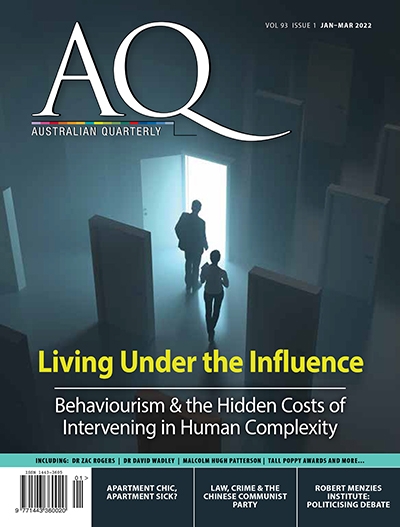- AQ Magazine
- Back Issues
- AQ Back Issues 2008 to 2024
- AQ Back Issues 2022
- AQ Volume 93, Issue 1
AQ 93.1 - January 2022

Living Under the Influence: Behaviourism & the Hidden Costs of Intervening in Human Complexity
In 2008, Harvard Law Professor, Cass Sunstein co-authored the book Nudge: Improving Decisions about Health, Wealth, and Happiness. The book was a sensation, popularising the term Behavioural Economics and starting a global wave of governments setting up ‘Nudge Units’ – including in Australia. ‘Behaviourism’, as it's commonly known, is the idea that governments could create policy to subtly modify the actions of citizens, ie. Promoting public health outcomes or helping people to better save for their retirement. But is behaviourism just deployed to sidestep the real structural reforms required to mitigate systemic power imbalances?
Zac Rogers
Apartment chic, apartment sick? The quiet virtues of due diligence
Dense, apartment living in Australia used to be synonymous with public housing. Yet Inner City lifestyles are increasingly desirable for a range of economic factors, and apartment living is now the reality for a large number of Australians. Yet in this building and buying frenzy what are the risks? Do you buy OTP – or risk getting outbid at auction? Will you be getting what you pay for – or a mess of body corporate bylaws, lawyers, cowboy builders and noisy neighbours? A little bit of due diligence might save you more than just money.
David Wadley
International Law, Organised Crime and the Chinese Communist Party
On the 19th of July 2021, the US Government Administration published evidence in support of its view that a fruitful symbiosis very probably binds organised crime to the Chinese Communist Party (CCP) government and that this collaboration was being used as a weapon of international interference. What role does customary international law play in responding to transgressions that breach one country’s obligations to another? Can multilateralism still play a role in mediating these responses and what are some of the mechanisms by which they can do so?
Malcolm Hugh Patterson
The Politicisation of Open Debate: The Hypocrisy of the Robert Menzies Institute
Universities have been, and should always be, a place to exercise free speech and engage in open debate. Yet the foundation of the Robert Menzies Institute at the University of Melbourne has been met with protest and acrimony by some staff and students. Is this ‘cancel culture’ gone too far; is this a betrayal of the university’s credo of free speech? Or is this just the next volley in Australia’s ongoing culture wars?
Joel Italia
